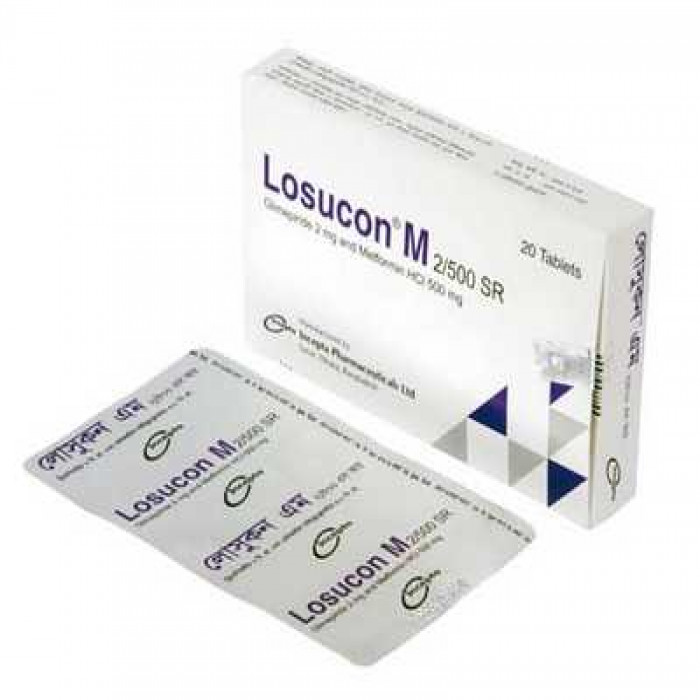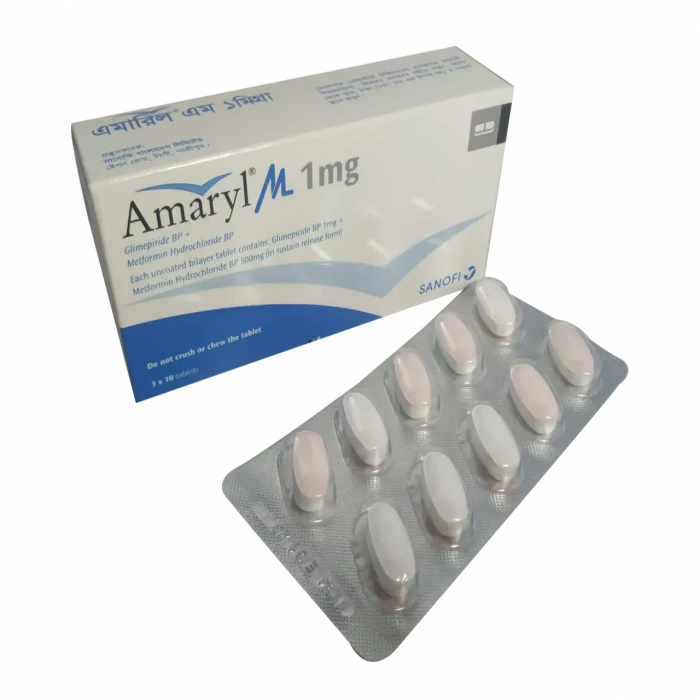
✔ 100% Authentic Product
👁️ Currently Viewing 2454
Losucon M 1/500 SR Tablet
Losucon M 1/500 SR Tablet is used to treat type 2 diabetes mellitus; when diet, exercise, and glimepiride or metformin alone are not able to control the blood sugar levels.
Discount
Price: ৳ 85
MRP:
৳
90
6%
Off

100% Genuine Products, Guaranteed

Safe & Secure Payments, Always

Fast, Secure & Efficient Delivery

Proper Packaging
 Cash on Delivery - All over Bangladesh
Cash on Delivery - All over Bangladesh Regular Delivery - 12-24 Hours, Dhaka City* Charge Tk.39-59
Regular Delivery - 12-24 Hours, Dhaka City* Charge Tk.39-59 Regular Delivery - 24-48 Hours, Other Cities* Charge Tk.99-110
Regular Delivery - 24-48 Hours, Other Cities* Charge Tk.99-110
 ফ্রি ডেলিভারিঃ - ৯৯৯ টাকা+ অর্ডারে, ঢাকা
শহরে
ফ্রি ডেলিভারিঃ - ৯৯৯ টাকা+ অর্ডারে, ঢাকা
শহরে ফ্রি ডেলিভারিঃ - ২৯৯৯ টাকা+ অর্ডারে, ঢাকার
বাহিরে
ফ্রি ডেলিভারিঃ - ২৯৯৯ টাকা+ অর্ডারে, ঢাকার
বাহিরে
100% Genuine Products, Guaranteed
Safe & Secure Payments, Always
Fast, Secure & Efficient Delivery
Proper Packaging
 Cash on Delivery - All over Bangladesh
Cash on Delivery - All over Bangladesh Regular Delivery - 12-24 Hours, Dhaka City* Charge Tk.39-59
Regular Delivery - 12-24 Hours, Dhaka City* Charge Tk.39-59 Regular Delivery - 24-48 Hours, Other Cities* Charge Tk.99-110
Regular Delivery - 24-48 Hours, Other Cities* Charge Tk.99-110 ফ্রি ডেলিভারিঃ - ৯৯৯ টাকা+ অর্ডারে, ঢাকা
শহরে
ফ্রি ডেলিভারিঃ - ৯৯৯ টাকা+ অর্ডারে, ঢাকা
শহরে ফ্রি ডেলিভারিঃ - ২৯৯৯ টাকা+ অর্ডারে, ঢাকার
বাহিরে
ফ্রি ডেলিভারিঃ - ২৯৯৯ টাকা+ অর্ডারে, ঢাকার
বাহিরে
✅ Description:
- Glimepiride + Metformin is a combination of antidiabetic drugs used to manage Type 2 diabetes, especially when blood sugar levels are not adequately controlled by lifestyle modifications alone.
- Type 2 diabetes is a chronic condition affecting glucose processing. It's characterized by insufficient insulin production or resistance to insulin's effects.
- his combination contains Glimepiride and Metformin. Glimepiride stimulates insulin-producing beta cells in the pancreas, aiding sugar removal from the blood. Metformin PR (prolonged-release) formulation gradually releases the drug, reducing sugar production by liver cells and slowing sugar absorption from the intestines. It also enhances muscle cell sensitivity to insulin, aiding sugar removal from the blood.
- Follow your doctor's prescription and take Glimepiride + Metformin as advised. Common side effects like stomach pain, nausea, diarrhea, vomiting, headache, or a metallic taste are usually temporary and not usually concerning. Consult your doctor if these persist or worsen.
- If you're allergic to this medication or any others, inform your doctor.
- Glimepiride + Metformin isn't recommended for children.
- Avoid breastfeeding while taking it, as it can be excreted in breast milk.
- Inform your doctor if you're pregnant or planning to be, as it might affect the unborn baby.
- Alcohol should be avoided with Glimepiride + Metformin due to the risk of lactic acidosis.
- If you're driving, make sure you're alert after taking the medication.
- Consume short, frequent meals and avoid prolonged fasting while on this medication.
- Always adhere to your doctor's guidance and closely monitor your blood sugar levels while taking Glimepiride + Metformin. If you have any concerns or experience adverse effects, consult your doctor promptly.
Safety Advices

Alcohol
UNSAFE
While on Losucon M 1/500 SR Tablet, avoid alcohol consumption. Alcohol can affect the blood sugar-lowering effects of the Losucon M 1/500 SR Tablet and increase the risk of lactic acidosis.

Pregnancy
CONSULT YOUR DOCTOR
Losucon M 1/500 SR Tablet should not be taken during pregnancy. If you're planning to become pregnant, consult your doctor before considering Losucon M 1/500 SR Tablet.

Breastfeeding
CONSULT YOUR DOCTOR
Avoid taking Losucon M 1/500 SR Tablet during breastfeeding, as it can pass through breast milk. Consult your doctor for advice if you're considering Losucon M 1/500 SR Tablet while breastfeeding.

Driving
CAUTION
If you experience low or high blood sugar symptoms (like dizziness, tiredness, shaking, and trembling) or if altered blood sugar levels cause visual problems, refrain from driving or handling machinery.

Kidney
CONSULT YOUR DOCTOR
Severe kidney disease patients should avoid Losucon M 1/500 SR Tablet. For those with kidney disease, caution is advised, and your dosage might need adjustment based on kidney function. Consult your doctor before using Losucon M 1/500 SR Tablet.

Liver
CONSULT YOUR DOCTOR
For severe liver disease patients, Losucon M 1/500 SR Tablet is not recommended. Patients with liver disease should use it cautiously, with dose adjustments as needed based on liver function. Consult your doctor before taking Losucon M 1/500 SR Tablet.
✔️ Uses of Losucon M 1/500 SR Tablet
- Treats type 2 diabetes mellitus (when diet, exercise, and the single agent do not result in adequate glycemic control)
✔️ How does Losucon M 1/500 SR Tablet work?
Losucon M 1/500 SR Tablet is used to regulate blood glucose levels. Its components, glimepiride, and metformin, have distinct mechanisms. Glimepiride boosts insulin secretion by the pancreas to decrease blood glucose. Metformin reduces liver glucose production, slows intestine glucose absorption, and enhances insulin sensitivity.
✔️ Side Effects of
- Headache
- Nausea
- Vomiting
- Nausea
- Sleepiness
- Low blood sugar level
✔️ Quick Suggestions:
- Losucon M 1/500 SR Tablet is an anti-diabetic medicine. It is used for the management of type 2 diabetes mellitus. It contains a combination of glimepiride and metformin as active ingredients.
- Take this medicine in the exact dose and duration prescribed by the doctor. Do not change the dosage or frequency of use without consulting your doctor.
- Along with taking Losucon M 1/500 SR Tablet, it is essential that you do certain lifestyle modifications like exercising for 30 minutes daily, maintaining a healthy weight, managing stress, getting enough sleep, and avoiding smoking and drinking alcohol.
- To maintain control of your blood sugar levels, it is also advised to eat a balanced diet that includes fruits and vegetables.
- Regularly monitor your blood sugar levels as directed by your doctor and report any changes.
- Before starting Losucon M 1/500 SR Tablet, inform your doctor if you are pregnant, planning a pregnancy, or breastfeeding and about your detailed medical history.
- To make sure that this tablet works effectively, it is important to take it at the same time every day and not miss a dose. If you miss a dose, take it as soon as you remember. Take your next dose at the regular time if it is almost time for your next dose.
- Headache, stomach pain, sleepiness, and nausea/vomiting may occur in some individuals with the use of the Losucon M 1/500 SR Tablet. Inform your doctor if these effects bother you or do not go away.
✔️ Indication
For individuals with type 2 diabetes mellitus, this medication is recommended as an adjunct to diet and exercise in the following scenarios:
- When glimepiride or metformin used as single therapies do not achieve adequate glycemic control.
- As a replacement for a combination treatment of glimepiride and metformin.
✔️ Pharmacology
Glimepiride is an anti-diabetic drug from the sulfonylurea class that lowers blood glucose levels. It primarily works by boosting insulin release from active pancreatic beta cells. It also enhances beta cell sensitivity to glucose, leading to increased insulin production. Additionally, Glimepiride might affect glucose absorption, peripheral tissue insulin sensitivity, and hepatic glucose production. A single dose of Glimepiride can provide a 24-hour hypoglycemic effect in non-fasting individuals with diabetes.
Metformin Hydrochloride, on the other hand, is an oral antihyperglycemic medication from the biguanide class. It's used for type 2 diabetes treatment. Unlike sulfonylureas, it doesn't cause hypoglycemia. Metformin reduces both basal and postprandial plasma glucose levels. It operates by reducing hepatic glucose synthesis, decreasing intestinal glucose absorption, and enhancing insulin sensitivity. This is achieved by increasing peripheral glucose uptake and utilization.
✔️ Dosage & Administration of Losucon M 1/500 SR Tablet
- The dosage of this tablet is determined by the target blood glucose level. It's important to maintain the lowest effective dose for desired metabolic control. Regular monitoring of blood and urine glucose levels is necessary during treatment.
- Mistakes like missing a dose should not be compensated by taking a larger dose afterward.
- Since better diabetes control improves insulin sensitivity, the need for glimepiride may decrease as treatment progresses. Thus, dose reduction or discontinuation might be necessary to prevent hypoglycemia.
- The maximum recommended daily dose is 8 mg of glimepiride and 2000 mg of metformin.
- To prevent hypoglycemia, the initial dose of this tablet should not exceed the daily doses of glimepiride or metformin that were previously taken.
- When transitioning from separate glimepiride and metformin tablets, maintain the existing dosage of the combination therapy based on current usage.
✔️ Interaction
Drug-Drug Interaction: Glimepiride + Metformin could interact with various medications:
- Antibiotics (rifampicin, trimethoprim)
- Calcium channel blockers (verapamil)
- Antacids (cimetidine)
- HIV/AIDS drugs (dolutegravir)
- Heart-related meds (ranolazine)
- Anticancer drugs (vandetanib, crizotinib, olaparib)
- Antifungals (fluconazole, miconazole)
- Water pills (acetazolamide)
- Antidiabetic drugs (insulin)
- Anticonvulsants (phenytoin)
Drug-Food Interaction: Avoid alcohol consumption while on Glimepiride + Metformin. Combining them might raise the risk of lactic acidosis.
Drug-Disease Interaction: Inform your doctor if you have:
- Severe infections
- Uncontrolled diabetes
- Lactic acidosis or ketoacidosis
- Dehydration
- Liver or kidney issues
✔️ Contraindications
- Allergy: If you are allergic to metformin, glimepiride, or any other ingredients in the tablet.
- Pregnancy/Breastfeeding: If you are pregnant or breastfeeding.
- Kidney or Liver Failure: If you have kidney or liver failure.
- Metabolic Acidosis: If you have metabolic acidosis, including conditions like lactic acidosis, diabetic ketoacidosis, or diabetic pre-coma.
- Dehydration and Severe Infections: If you are suffering from dehydration, severe infections, or shock, or are receiving injections containing iodine.
- Heart or Lung Failure: If you have a history of heart or lung failure, heart attack, or shock.
- Alcoholism: If you are an alcoholic.
✔️ Pregnancy & Lactation
During Pregnancy:
Glimepiride: Pregnant individuals should avoid using Glimepiride as it could pose a risk to the fetus. Switching to insulin is recommended during pregnancy to ensure the safety of the unborn child. If planning to become pregnant, inform your doctor and discuss a suitable treatment plan.
Metformin: Metformin should not be used for diabetes treatment when planning to become pregnant or during pregnancy. Insulin is advised to maintain blood glucose levels as normal as possible, minimizing the risk of fetal malformations associated with abnormal blood sugar levels.
During Lactation:
Glimepiride: Breastfeeding mothers should avoid using Glimepiride to prevent the potential transfer of the medication to the infant through breast milk, which could be harmful. If needed, consider switching to insulin or discontinuing breastfeeding.
Metformin: Nursing rats secrete metformin in breast milk. While similar data in humans isn't conclusive, the decision to continue breastfeeding or discontinue it in favor of metformin should be made based on weighing the benefits of the medication for the mother against potential risks to the infant. Consult with a healthcare provider to make an informed decision.
✔️ Precautions & Warnings
For Glimepiride:
Initial Weeks and Hypoglycemia Risk: During the initial weeks of Glimepiride treatment, the risk of hypoglycemia (low blood sugar) may increase. Close monitoring is crucial during this period. If risk factors for hypoglycemia are present, dosage adjustments of Glimepiride or the entire treatment plan might be necessary. This holds true in cases of illness or significant lifestyle changes as well. While measures can initially control hypoglycemia, it's important to note that recurrence can happen.
Continuous Observation: Patients should remain under close observation, especially for severe hypoglycemia. Immediate treatment, medical follow-up, and potentially hospital care might be required.
G6PD-Deficiency Caution: Sulfonylurea agents, including Glimepiride, can lead to hemolytic anemia in patients with G6PD deficiency. Caution is advised in such cases, and non-sulfonylurea alternatives should be considered.
For Metformin:
Hypothyroidism Monitoring: Patients with hypothyroidism should have their thyroid-stimulating hormone (TSH) levels regularly checked during metformin therapy.
Vitamin B12 Levels: Prolonged metformin use can lead to decreased vitamin B12 levels, potentially causing peripheral neuropathy. Regular monitoring of vitamin B12 levels is recommended.
These precautions underscore the importance of close monitoring, particularly in the initial stages of Glimepiride treatment and during metformin therapy. Consult your healthcare provider if you have any concerns or experience any adverse effects.
✔️ Storage Conditions
Store at room temperature in a dry place. Protect it from direct sunlight and moisture. Keep it away from children and pets.
⚠️Disclaimer:
At ePharma, we’re committed to providing accurate and accessible health information. However, all content is intended for informational purposes only and should not replace medical advice from a qualified physician. Please consult your healthcare provider for personalized guidance. We aim to support, not substitute, the doctor-patient relationship.








